-
CLOSENESS/TESNOTA (Kantemir Balagov 2017)
KANTEMIR BALAGOV: CLOSENESS/TESNOTA (2017)
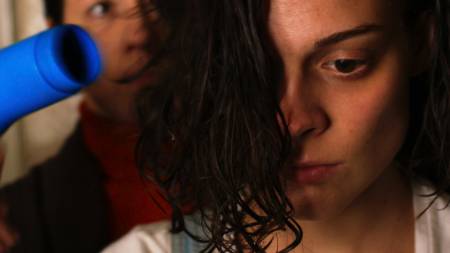
A dose of family, in bright boxy color
Balagov's colorful intensity forces itself upon us from the start. The opening scene is of a sister and brother, whose flirtation and dirty talk may define the title for us: this is a world of family and tribal intimacy.
The title states a theme worked out narratively and visually in Balagov's intense, slow-moving film about a Jewish family in Russia. It's in squarish Academy ratio, which is claustrophobic in itself, with that effect amped up by intensifying the color of the images and making them mostly closeups, so close sometimes it's hard to see the people in the shots. The closeness is family and tribe. The opening scene is a too-intimate one between the grown brother and sister. The family is Jewish. She is a tomboy who works in their father's garage and prefers overalls. He is about to be married to his love, Lea. She has a secret lover, from an obscure tribe whom her parents might not approve of and who might not approve of her. They meet clandestinely, often in a car. Then her brother and Lea are kidnapped and held for ransom. The Jewish community, led by the rabbi, are unable to raise all the ransom money. They decide to sell the garage and its contents and this will mean they will have to move. The are constantly moving and they had begun to fit in, but that's over. Only when the brother comes back the issue becomes: will he go with the family? Will Lea? Will his sister?
All of this matters so intensely that it pushes all else away, each one thing occupying the small crowded box of the screen at a time and making it seem as if there is nothing else. Thus Balagov captures the beauty and oppression of a rich ethnic family life in a small, encroached-upon tribal community struggling to exist against the world.
Many including audience members at the Cannes Un Certain Regard original screening of this film have objected to the use of a real "snuff film," showing Russians being threatened, tortured, and killed, which goes on for several minutes. This is just the most oppressive and drawn-out passage of a film that tends, for some of us, to feel oppressive and drawn-out for much of its nonetheless distinctive and in its own way beautiful run-time.
Reviewed by Jessica Kiang as part of Un Certain Regard at Cannes in Variety: "An ethically indefensible choice mars Russian first-timer Kantemir Balagov’s otherwise impressively tough-minded debut," she began, pointing to the use of what might be considered a real 'snuff film' in its contents. "Even without its most controversial segment," Kiang said, this is "a demanding, difficult watch, presents an unavoidable [ethical dilemma}" whether to consider this inclusion remotely acceptable, of at midpoing a lengthy excerpt from a "scratchy and degraded VHS tape" of the kind we know from ISIS, of "anti-Semitic Islamist violence and murder." Tara Brady of The Irish Times explains it is "actual footage from the 1999 Dagestan massacre - in which Chechens torture Russian soldiers.". "the sequence goes on for a long time," Kiang writes, and the press notes indicate its not just realistic but real. .
Closeness is a tough-minded, rigorously composed, quite brilliantly acted story of the challenges of everyday religious prejudice and ethnic divides in the bleak heart of Russia’s North Caucasus, and in many ways Balagov’s uncompromising but stylized social realism rewards as much as it punishes. But in including this real video — essentially a snuff movie — within a fiction narrative and not announcing it as such, a line is crossed. . ." But Tara Brady concluded with: "A divisive and discombobulating new talent has arrived on the Croisette."
Closeness/Tesuta 118 mins., debuted in Un Certain Regard at Cannes May 2017. Opened theatrically in France, very well received (AlloCinÚ press rating 4.1) Reviewed as part of New Directors/New Films, FSLC and MoMA, Mar. 2018.
Showtimes:
Saturday, March 31, 4:30pm [MoMA]
Sunday, April 1, 4:30pm [FSLC]
Last edited by Chris Knipp; 02-24-2019 at 12:50 PM.
-
SCARY MOTHER /SASHISHI DEDA (Ana Urushadze 2018)
ANA URUSHADZE: SCARY MOTHER/SASHISHI DEDA (2017)
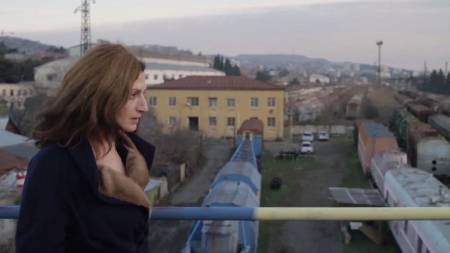
NATO MARVANIDZE IN SCARY MOTHER
Genius and madness are often linked, perhaps because genius is outside the norm. Plain folks may not understand it. When a brilliant writer approaches the surreal, who can follow? One of the accomplishments of Georgian director Ana Urushadze's debut feature is the way we remain unsure to the end of the middle-aged mother working on a troubling manuscript, expressing a long-repressed desire to write, has lost it, as her conventional husband says, or is creating a work of incomparable originality, as her friend the stationary store owner fervently believes.
Her husband says in the opening scene that his wife looks disheveled and worn out. Yes, she does, a bit; but throughout she is capable of maintaining an upright, elegant look as well. Urushadze maintains a nice level of clarity and a firm narrative line. Much credit is due also to Ramaz Ioseliani, the admirable actor playing Nukri, the stationary store owner, who not only champions Manana (Nato Murvanidze), but sets up a room for her in the back of his store as a retreat - and he has no ulterior motives. He really is trying to find Manana a publisher, and nurturing what he feels is an extraordinary new work of literature.
Anri (Dimitri Tatishvili), Manana's upright spouse, thinks what she has written is extreme pornography. So do some of the publishers who have looked at her 150 finished pages (she has to find an ending). But didn't they say that about Henry Miller and William Burroughs?
To us Manana may seem crazy at times, certainly. But isn't that because she is in the white heat of creative fervor?
Urushadze makes her film turn more and more into a thriller, a mystery, and a chase, admirably speeding up the tension. She introduces a fourth hand in the game: Jarji, Manana's father, who is translating the manuscript, without knowing yet that it is hers. He is played by the quite extraordinary Avtandil Makharadze, who builds up a maniacal energy of his own. Meanwhile Manana has three handsome children, two boys and a girl, all upright and fine. Where does her explosion of creative power come from? Jarji, no doubt.
The film was reviewed at Antalya Film Festival (competing) by Jessica Kiang in Variety. She described the theme of Urushadze's "darkly daring debut" as " A middle-aged Georgian woman finds freedom, ferocity and freakiness in writing her first novel" and noted, "The vast, largely unmapped terrain of a middle-aged mom’s creative life gets a witchily weird, uncompromisingly assured showcase in Georgian director Ana Urushadze’s exhilaratingly offbeat oddity. [The film's] cerebral chilliness, emotional remove and narrative abstruseness might make it a hard sell in that context. . .this is nevertheless a startling debut that wholly earns its place as standard-bearer for one of the most exciting and distinctive national cinemas to have emerged in recent years." This is indeed a fresh and original and well-made film.
Scary Mother/Sashishi Deda, 107 mins.,debuted at Locarno, won a prize at Sarajevo, also at Atalya, and was, not surprisingly, Georgia's Best Foreign Oscar entry for 2018. Screened for this review as part of FSLC and MoMA's New Directors'/New Films series, March 2018.
ND/NF showtimes:
Saturday, March 31, 9:00pm [FSLC]
Monday, April 2, 6:00pm [MoMA]
Last edited by Chris Knipp; 03-15-2018 at 08:31 PM.
-
AN ELEPHANT SITTING STILL (Hu Bo 2018)
HU BO: AN ELEPHANT SITTING STILL (2018)
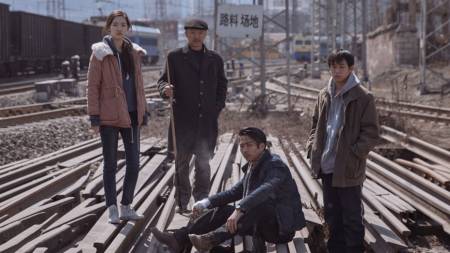
WANG YUWEN, LI CONGXI, YU ZHANG, AND PENG YUCHANG IN AN ELEPHANT SITTING STILL
Extraordinary first film, by a young director too soon lost
This four-hour, intimate, almost real-time epic follows several people of different ages at the end of their tether who converge finally at the train station heading for the same escape, the city of Manzhouli where they say an elephant simply sits and ignores the world. The style made me, like others, think both of Edward Yang (A Brighter Summer Day) and Jia Zhang-ke (Unknown Pleasures), and this profound, ambitious work of an impressive new filmmaker takes on a tragic resonance because he committed suicide, at 29, so all this promise will never be realized again. A sad astonishment.
Reviewed at Berlin in Hollywood Reorter by Clarence Tsui: "An Elephant Sitting Still began with a myth — and ended up becoming a myth itself. Revolving around four characters shaken out of their small town stupor by an enigmatic tale about a lethargic pachyderm, the film attained instant cult status among critics at the Berlinale, where it premiered in the Forum sidebar, because of the suicide of its 29-year-old novelist-turned-director Hu Bo last October." Tsui notes a debt to s Krzysztof Kieslowski and Bela Tarr for its fatalistic worldview and "omnipresent tracking shots."
Another reviewer (actually several, the present writer included) saw elements of Edward Yang and Jia Zhangke. Tsui adds, "Elephant isn’t exactly the film maudit suggested by the difficult circumstances from which it emerged. Long and a bit unwieldy, and self-consciously philosophical in parts, yes, but Hu's first (and sadly last) feature weaves together its narrative threads clearly and sturdily." In Sight and Sound Giovanni Marchini Carnia calls the film "A shattering, soul-searching debut (and one-off)."
Writing for the site Filmstage from Berlin, Zhuo-Ning Su makes some astute observations about this film's strengths and weaknesses, notably how the director "writes microscopically, detailing the characters’ circumstances and choices at every turn, but addresses at the same time something on a much larger scale–an ancient civilization slowing losing its human touch." Zhuo-ning uses some marvellous phrases, calling the film a "grand tapestry of sorry." He's also right on the film's faults, that the "time element" may not be well-considered, making too much happening on the same day, and the "intellectual exposition," the expressions of the hopelessness and meaningless of existence, are unnecessarily repetitive. I simply find the film visually unsatisfying at some points, and too murky in the interiors by half. The much-admired long takes and long tracking shots might have been curtailed, in the interests of economy and toward the achievement of a more manageable run-time. But great talents are sometimes unwieldy and hard to contain.
In any case, the film and the stories it tells haunt you.
The way the camera doggedly, but deftly, follows the people around is somehow both obsessive and calm. In classic fashion, it is an eye: you are there. The world around is indifferent, yet penetrated with violence, cacophonous. It's nowhere and everywhere in contemporary China, dreary, vast, in rapid flux yet somehow also deserted-seeming. There is violence and indifference everywhere.
The narrative follows four main characters. There is a family that wants to put the grandfather, Lao Jin (Congxi Li), a retired man who doesn't look very old and is perfectly agile, into a home for the aged to make more space. And this man loses his dog when it is attacked by another dog that causes its death. A teenage boy, who emerges as the main protagonist, is Wei Bu (Peng Yuchang), a 17-year-old who stands up for himself and his buddy against the menaces and accusations of the local school bully, which results in a shoving match and the bully's fall down a cement stairway, apparently leaving him dead. Wei Bu's classmate and crush, Huang Ling (Wang Yuwen), is dating the married vice-principal to escape from her cruel mother. Yu Cheng (Yu Zhang), a slick, goodlooking petty hoodlum type, in the area and vaguely connected to the others, we learn later has slept on this momentous day with his best friend's girl, and sees his best friend jump to his death when he knows. The neatly woven action eventually brings these four people together on the way to Manzhouli.
Elephant Sitting Still, 234 mins., debuted at the Berlinale. Also shown at New Directors/New Films, where it was screened for this review. The late filmmaker, a Beijing Film Academy graduate, had also directed a couple of award-winning short films and published two novels.

HU BO
Last edited by Chris Knipp; 01-24-2020 at 12:12 AM.
-
COCOTE (Nelson Carlo de los Santos Arias 2017)
NELSON CARLO DE LOS SANTOS ARIAS: COCOTE (2017)

A clash of images and rituals
The Dominican filmmaker Nelson Carlo de los Santos Arias is drunk on sound and images. He enjoys sliding between color and black and white and different size formats, between still, wide pans and uptight agitated coverage of intense local gospel meetings amped by drum beats, depicting a clash of Catholicism and West African mysticism.His use of sound early and late in Cocote, his debut feature, isn't just ethnographic but radical and dramatic. In purely cinematic terms the viewer shares the intoxication of this interwoven ethnic, ritual, and visual blend - until it begins to clog the intended narrative a bit. Because there is a narrative, and an intensely driven, even if blocked one.
Alberto (Vicente Santos), the stifled, conflicted protagonist, a tall, awkward black man, is a gardner on a wealthy estate. He is also an evangelical Christian. We see only the wide, distant shot of the very large pool, which bookends the film. News of his father's death takes him to his rural "pueblo." Here he learns his father has been brutally murdered, decapitated, probably by a policeman. He is moved to revenge. But that goes against his Christian faith. So does the requirement that he attend pagan ceremonies rooted in Dominican Vodou that are part of the local obsequies for his father.
Never mind that Alberto is blocked morally and emotionally. The film itself is sidetracked by a wealth of documentary footage of those ceremonies and of impassioned, repetitive preaching that the director must have, understandably, thought too good to leave out, but somehow does not have quite the skill to include and still maintain narrative rhythm and suspense.
The synthesis of ethnographic documentary and scripted drama is an intoxicating but uneasy one. There is a situation here, more than a plotline. The real locations and people never cease to feel alive and exotic, but the revenge story keeps getting submerged, and it doesn't feel right. But it isn't entirely wrong either, though: Alberto is being urged to revenge by his family, but it goes strongly against his gospel Christianity, so he really is stuck. Perhaps if Alberto were stronger as a character all this would work better. As it is, as a first feature by a previous maker of a documentary and several shorts, this is a promising sign of ambition and passion that's been justifiably compared to the films of Glauber Rocha and fiction of Roberto Bola˝o.
Cocote is a study of class and power. After an hour of glorious images, documentary vibrancy, and narrative stagnation, Alberto meets up with someone who may be his father's killer, a cop who explains that helps but means nothing against the powerful. It sounds as violent a world as anywhere in Latin America, as Mexico among the cartels.
The climax feels rushed into the last fifteen minutes - though there is a beautifully ironic, and differently documentary, final sequence of rich folks talking falsely sociable nonsense around that big pool.
Cocote, 107 mins., debuted at Locarno Aug. 2017 in the Signs of Life section, winning the Best Film Award, and the film has been in a half dozen other international film festivals, including Toronto, Hamburg, Mar del Plata and Miami. It was screened for this review as part of the 2018 edition of the Museum of Modern Art-Film Society of Lincoln Center series, New Directors/New Films. A Grasshopper Film release.
In New Directors/New Films:
Tuesday, April 3, 6:15pm [FSLC]
Wednesday, April 4, 8:15pm [MoMA
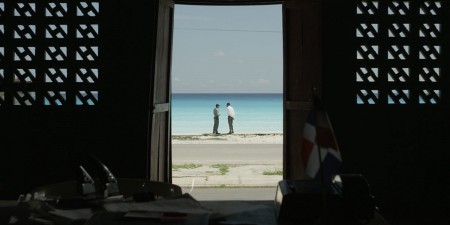
Last edited by Chris Knipp; 04-01-2018 at 05:39 AM.
-
THE GREAT BUDDHA + (Huang Hsin-yao 2017)
HUANG HSIN-YAO: THE GREAT BUDDHA + (2017)
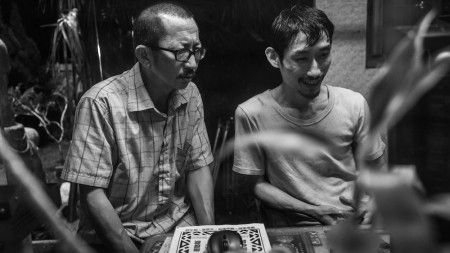
CRES CHUANG AND BAMBOO CHU-SHENG CHEN IN THE GREAT BUDDHA
Forbidden pleasures
Huang Hsin-yao's catch-all titled The Great Buddha is the most clever and witty film in this year's New Directors series so far and likely to remain so. For some reason it reminded me of the droll Mexican minimalist Fernando Eimbcke of Lake Tahoe and Duck Season, though really its emphasis on electronic game-playing and its well-thought-out nexus of religious hypocrites, crooked politicians, minor fat-cats and low-level losers is different; so is the self-reflective irony of the filmmaker introducing himself before th film starts to roll, and interrupting with commentary. Maybe it's the drollery and sympathy for underdogs that's the link with Eimbcke. Anyway the pleasure felt similar.
The dangerously scrawny Belly Button (Bamboo Chu-Sheng Chen) and bespectacled Pickle (Cres Chuang) are a perfect pair of loser buddies: they couldn't be more invisible, and that's why entering their imaginative world feels special and their quietly combative intimacy feels real. Pickle is the night security guard for a little factory that produces Buddhas, including one big one that's featured in the spectral final scene where it's the center of a cultish celebration. But it looks like a fly-by-night place. Do these guys have any life or friend than each other? Belly Button is a scavenger who lives in a shack. He reminded me of the father in Kurosawa's Do-des-ka-den. PIckle moonlights in a funeral band to help care for his aging mother. That his status matches Belly Button's is shown by his sharing girlie mags with sticky pages and receiving and consuming with only mild complaint partly frozen, expired bento meals dumped by convenience stores. Pickle at least has a job and a mother, but as Maggie Lee points out in her review for Variety written at Taipei, Belly Button gives himself a sense of status by bullying or looking down on Pickle for his naivete about most things and general nerdiness.
Into this yucky world comes a dangerous entertainment: watching the factory boss' dashcam memory card images from his new Mercedes, Belly Button's idea of entertainment to fill in for a broken TV. Now this is a medium new to feature films. But it turns out to be a great one. The images of The Great Buddha proper are black and white; the dashcam ones are in lurid digital color. The metaphor is one aspect, the rest is sheer visual pleasure. The trouble for the surreptitious snoopers is most of the memory card videos are nothing. But a few times they hit pay dirt.
Pickle's boss Kevin Huang (Leon Dai) is sleazier and more evil than they had imagined. The dashcam card shows him in, shall we say, compromising positions with several women, not his wife.
Another aspect, a subplot that's not insignificant but never gets in the way of the loser drama, is the big Buddha, and the cult that visits and the annoying woman who critiques the Buddha, on which her group is to take delivery. And some appearances of local officials, throwing their weight around.
The new formats, including the self-reflective voiceover, the dashcam adventure, and the passages increasingly depicting boss Huang as a creepy loser who yet deserves some sympathy for the hairpiece toupee he always wears, are the highpoints of this inventive and droll production that's none the less for being an expansion of a prize-winning short. I must rely on Maggie Lee for the information, not a surprise however, that the two underdogs' dialog reps "vulgar banter" that's "wickedly funny", and that in Huang's personal voiceover, "choice use of puns and obscenities in Taiwanese dialect is a source of constant delight as well as insight into his protagonists’ inner thoughts." The "+" in the English title is a reference to the iPhone6, she also explains. I am sure much more is to be gleaned in repeated watches of this thought-provoking and ingenious film, which not surprisingly is heralded by Lee as the best in a year of resurgence of a recently dormant Taiwan cinema, and the big prizewinner at the local Oscar equivalents.
The Great Buddha +, 104 mins, in Taiwanese and Mandarin, debuted at Taipei, and was subsequently included in ten or so other international festivals including Toronto, Busan, Tokyo and Palm Springs, opening on the Internet in Canada and the US in Feb 2018 after Jan. limited releases. Screened for this review as part of the MoMA-Film Society of Lincoln Center 2018 New Directors/New Films series.
.
ND/NF showtimes:
Tuesday, April 3, 8:45pm [MoMA]
Wednesday, April 4, 6:30pm [FSLC]
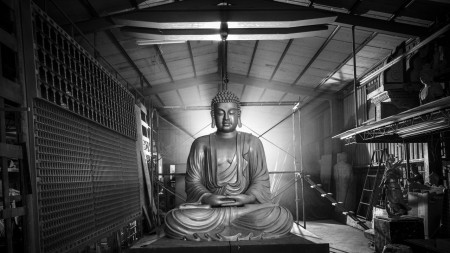
Last edited by Chris Knipp; 02-24-2019 at 01:05 PM.
-
BLACK MOTHER (Khalik Allah 2018)
KHALIK ALLAH: BLACK MOTHER (2018)
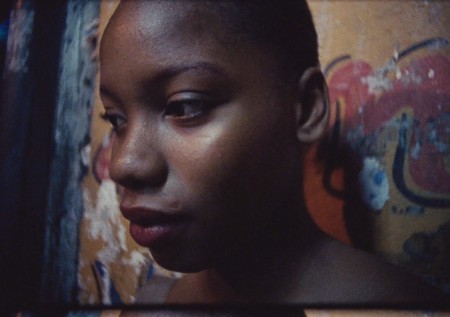
Jamaica in a visual tone poem
Khalik Allah's short documentary feature is in the nature of a long poem of cross purposes about Jamaica, land of the director's maternal grandfather, with many motion picture snapshots of local people from different times accompanied by multiple voices speaking about life, motherhood, God, Rasta and ganja, and other germane matters but not specifically lined up with the faces we see. There are country people and city people, prostitutes and holy man, though the overwhelming focus is on the poor. There is black and white and color, Super-8mm, HD video, and Bolex footage, there is meditative thought of death and it all ends with the birth of a child, the whole being organized into three trimesters following the pregnancy. This is not the kind of documentary that gives you specific information, but it may lead you to fall back on your own related memories in a more personal way. It is highly evocative, but negotiating the non-correspondence of related images can also ultimately be wearying.
According to Christopher Gray of Slant, writing from the True/False documentary festival in Columbia, MO, this film follows quite logically from Allah's first, which used the same technique of germane but out-of-synch images and testimony in an impressionistic montage, the 2015 Field Niggas being focused on drug addicts, prostitutes, and cops in a single intersection in Harlem. Gray adds that BeyoncÚ's Lemonade film works similarly, and Allah was its director as well.
Black Mother, 75 mins., was screened for this review as part of the MoMA-Film Society of Lincoln Center 2018 series New Directors/New Films.
ND/NF showtimes:
Wednesday, April 4, 6:00pm [MoMA]
Saturday, April 7, 6:00pm [FSLC]
Last edited by Chris Knipp; 02-24-2019 at 01:09 PM.
-
DJON ┴FRICA (JoŃo Miller Guerra, Filipa Reis 2018)
JO├O MILLER GUERRA, FILIPA REIS: DJON ┴FRICA (2018)
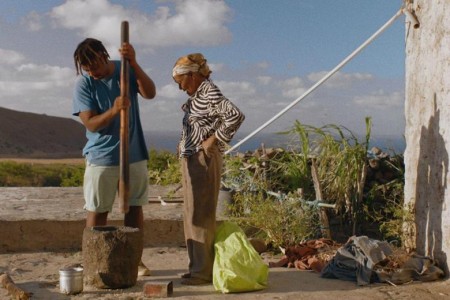
Picaresque ramble of a party boy searching for his father
JoŃo Miller Guerra and Filipa Reis are some more documentary filmmakers who've turned to a fiction feature based on their own material, and the focus of their last non-fiction effort, a young man of Cape Verdean origins born in Portugal. There are several classic themes wrapped up in this easy-going movie, which is more on atmosphere and the occasional colorful character than interesting plot twists. Yes, this is a bit of a picaresque tale, even an Odyssey - its hero is seduced from time to time by pretty women and intoxicating drink - and he gets seriously sidetracked and relieved of his wallet. Miguel (Miguel Moreira), also known as Djon ┴frica (Djon pronounced "John") or Tibars.
He's using electric clippers on the sides in the opening scene, leaving only some thin, stylish dreadlocks, making his look halfway between rasta and rap. Miguel is a big, easygoing school dropout of 25 with jutting lips and big gap teeth, and he's strong to be hired on construction sites, where he makes money he saves up for his first trip to the Cape Verde island archipelago off the West Coast of AFrica, to find his father, whom he's never seen. Even on the plane, in sequence that is half fantasy, he is surrounded by pretty Cape Verdean young women, and freely imbibes grogue, the strong national drink.
This is the pattern, and since he speaks the language and moves freely, Miguel slides right into the sunny world he meets. A big party leads to being fleeced by the pretty ladies, who disappear next morning. Eventually he winds up hired on a ferry boat by a tough old crone puffing a ciggy who keeps an old cow and some goats up in the hills. She hires him to do the work, in exchange for board, but no WC, because there ain't none. There is a gentle magic in these sequences, and they provide an engaging picture of a pleasant place with good-looking people, however crooked the government, as they tell him, may be.
There's no more to it than that.
Written by Pedro Pinho, director of The Nothing Factory, also playing in the New Directors festival.
I wonder if anyone would think of Pedro Costa, of Colossal Youth (SFIFF 2007) and other films, the preeminant film chronicler of Cape Verdeans in Portugal. A darker, more realistic picture comes from him, perhaps.
Djon ┴frica, 95 mins., debuted at Rotterdam, Jan. 2018, in the 2018 Hivos Tiger Competition, and bought for international distribution before that by the Paris based Still Moving . It was screened for this review as part of the MoMA-Film Society of Lincoln Center 2018 New Directors/New Films series.
ND/DF showtimes
Wednesday, April 4, 9:15pm [FSLC]
Friday, April 6, 6:00pm [MoMA]

MIGUEL MOREIRA
Last edited by Chris Knipp; 03-20-2018 at 05:31 PM.
 Posting Permissions
Posting Permissions
- You may not post new threads
- You may not post replies
- You may not post attachments
- You may not edit your posts
-
Forum Rules





 Reply With Quote
Reply With Quote










Bookmarks